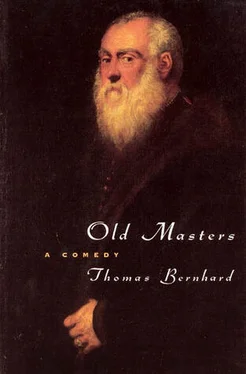line, were merchants, industrialists like my father, peasants of course at an earlier time, more often from Bohemia than from anywhere else, not so much from the Alps, more from the Alpine foothills, and there was also a massive Jewish contribution. Among my ancestors there was even an archbishop and a double murderer. No way, I have always told myself, will I investigate my origins in any greater detail, who knows what even more frightful horrors I might unearth, and I confess that that frightens me. People are unearthing their ancestors and rummage and rummage in their pile of ancestors until they have rummaged it all over and they finish up even more dissatisfied and doubly dismayed and desperate, he said. I have never been a so-called ancestor rummager, I lack the necessary disposition for that, but even a person like me does incidentally come across the strangest specimens of ancestors, this is something no one escapes, no matter how much he resists that so-called exhumation of ancestors, he keeps on digging. All in all I have come from an
exceedingly interesting mixture, a cross-section, as it were, o f everything that I am. To know less than I do know would have been better in this respect, but age inevitably brings a lot to the light of day, uninvited, he said. The one I like best is the joiner's apprentice who in eighteen forty-eight learned to read and write at Cattaro and in a letter proudly informed his parents in Linz of the fact, he said. This joiner's apprentice, on my mother's side, was stationed as a gunner at the fortress of Cattaro, present-day Kotor, and I still possess that letter which he, at eighteen it is said, radiant with joy, wrote from Cattaro to his parents in Linz, and on which there is a note from the official imperial post office to the effect that its
content is objectionable. We are everything that was in our ancestors, absolutely everything, plus what is in ourselves. To be related to Stifter has been a precious enormity to me all my life, until I discovered that Stifter was not the great writer or poet, whichever, whom I had venerated all my life. That I am related to Heidegger I have always known because my parents let it out at every opportunity. We are related to Stifter, and we are also related to Heidegger, and to Bruckner too, my parents would say at every opportunity, so much so that I often felt embarrassed. To be related to Stifter people always regard as something quite fantastic, certainly in Upper Austria but also throughout Austria, and it counts at least as much in society as if someone were to say that he was related to the Emperor Francis Joseph, but to be related to Stifter
and to Heidegger, that is the most extraordinary and the most amazing thing that one can imagine in Austria, and indeed also in Germany. And if, at a suitable moment, Reger said, you then add that you are related to Bruckner too, the people simply cannot recover from their amazement. To have a famous poet among one's relatives is already something special, but to have also a famous philosopher among one's relatives is of course even more fantastic, Reger said, and on top of it to be related to Anton Bruckner is the ultimate. My parents often mentioned his fact and of course derived advantage from it. The only crucial thing, however, was to mention these relationships in the right place; of course it goes without saying that they spoke of their relative Adalbert Stifter whenever they sought an Upper Austrian advantage, for instance from the provincial government on which every Upper Austrian is time and again dependent, or that Anton Bruckner was invoked chiefly when they had a problem in Vienna, Reger said; in the event of a Linz or Wels or Eferdingen problem, that is to say an Upper Austrian problem, they of course mentioned that they were related to Stifter; if they had a Vienna problem they would say that Bruckner was a relative of theirs, and when they were travelling through Germany they would say, a hundred times a day, that Heidegger was a relative of theirs, and they would always say that Heidegger was
a close relative of theirs, without honestly stating how closely Heidegger was actually related to them, because in fact Heidegger is related to them and hence also to me, albeit, as the phrase is,
very distantly. To Stifter, on the other hand, we are related
very closely and to Bruckner also
fairly closely, Reger said yesterday. That they were also related to a double murderer who spent the first half of his adult life in Stein-on-Danube and the second half in Garsten near Steyr, which are the two biggest Austrian penal establishments — that, needless to say, they never mentioned, although they should have invariably mentioned it in the same way. I myself have never shrunk from saying that one of my relatives had been a prisoner in Stein and in Garsten, which is probably the worst thing an Austrian can say about his relatives, on the contrary, I have mentioned the fact more often than would have been necessary, which of course can also be interpreted as a character flaw, Reger said. Similarly I never concealed the fact that I have tuberculosis and that I have always had tuberculosis, he said, and I have never in my life been afraid of this flaw or weakness. I have very often said that I am related to Stifter and to Heidegger and to Bruckner and to a double murderer who served his sentence in Steyr and in Stein, even when I was not asked about it, Reger said yesterday. We have to live with our relationships, no matter what they are, he said. After all, we
are those relationships, he said,
within myself I am all those relatives combined. Reger loves fog and gloom, he shies away from light, that is why he goes to the Kunsthistorisches Museum and that is also why he goes to the Ambassador, because at the Kunsthistorisches Museum it is just as gloomy as at the Ambassador, and while in the mornings he can, at the Kunsthistorisches Museum, enjoy his ideal temperature of eighteen degrees Celsius, he enjoys his ideal afternoon temperature of twenty-three degrees Celsius at the Ambassador, quite apart from anything else that, as he puts it, suits him at the Kunsthistorisches Museum on the one hand and at the Ambassador on the other. The sun can no more penetrate into the Kunsthistorisches Museum than it can into the Ambassador, that is as he likes it, because he does not like solar radiation. He avoids the sun, there is nothing he shuns more than the sun.
I hate the sun, you know that I hate the sun more than anything in the world, he says. What he likes best are foggy days, on foggy days he leaves the house very early in the morning, actually takes a walk, which he does not normally do, for basically he hates walking. I hate walking, he says, it seems so pointless to me. I walk, and while I am walking I keep thinking how I hate walking, I have no other thoughts at the time, I cannot understand that there are people who are able to think while walking, to think of something other than that walking is pointless and useless, he says. I prefer to walk up and down in my room, it is then that I have my best ideas. I can stand by the window for hours, looking down into the street, that is a habit I acquired in childhood. I look down into the street and observe the people and ask myself who are these people, and what is moving them down there in the street, what keeps them going, that, as it were, is my principal occupation. I have always exclusively concerned myself with people, nature as such has never interested me, everything in me was always related to human beings, I am, you might say, a fanatic for human beings, he said, naturally not a fanatic for humanity but a fanatic for human beings. I have always only been interested in human beings, he said, because in the nature of things they repelled me, I have never been attracted more intensively by anything than by human beings and at the same time never more thoroughly repelled by anything than by human beings. I loathe people but they are, simultaneously, the sole purpose of my life. When I get home from a concert at night I very often stand by my window until about one or two in the morning, looking down into the street and observing the human beings passing there below. During that observation I gradually develop my work. I stand by the window, looking down into the street, and at the same time I work on my essay. Towards two in the morning I do not, as you might think, go to bed but I sit down at my desk and write my essay. I go to bed around three in the morning but I get up again about half-past seven. At my age, of course, I no longer need a lot of sleep. Sometimes I sleep for only three or four hours, that is quite sufficient.
Читать дальше












